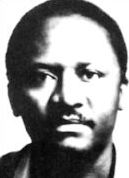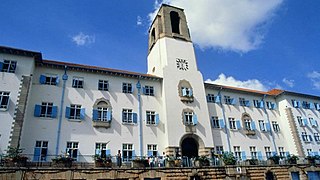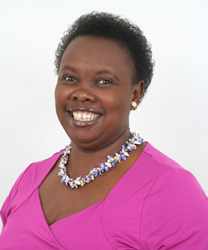
Timothy Wangusa (born 1942) is a Ugandan poet and novelist. [1] Wangusa was chairman of Uganda Writers Association and founder president of International PEN Uganda Centre.

Timothy Wangusa (born 1942) is a Ugandan poet and novelist. [1] Wangusa was chairman of Uganda Writers Association and founder president of International PEN Uganda Centre.
Wangusa is an ethnic Mumasaaba, born in Bugisu, in eastern Uganda. He studied English at Makerere University where he later served on faculty, and the University of Leeds (UK). He wrote his MA and PhD on British and African poetry, respectively.
Wangusa started working at Makerere University in 1969. He was appointed as Professor in 1981 (the first from Bugisu). In his acceptance speech 'A Wordless World,' he looked at how words were starting to lose meaning and there was a continuous shift from words and speech. Later Wangusa served as the Head of Department of Literature and Dean of Faculty of Arts. He was also a Minister of Education in the Ugandan Government (1985–86) and a Member of Parliament (1989–96). Presently, he serves as a Senior Presidential Advisor In Museveni's government. Wangusa played a pivotal role in establishing the Department of Languages and Literature at Uganda Christian University, an Anglican University in Mukono. [2]
His collection of poems Salutations: Poems 1965-1975 (1977), reissued with additional poems as A Pattern of Dust: Selected Poems 1965-1990 (1994), reflects his rural origins. The novel Upon This Mountain (1989) tells the story of Mwambu, who is determined to touch heaven, and describes his journey towards adulthood. [3] The novel combines African folklore and proverbs with Christian symbolism. Its main theme is that of growing up in the Ugandan society and what challenges come with growing up in the traditional setting. Wangusa's work has been featured on the pan-African poetry platform Badilisha Poetry Radio. [4]

Okot p'Bitek was a Ugandan poet, who achieved wide international recognition for Song of Lawino, a long poem dealing with the tribulations of a rural African wife whose husband has taken up urban life and wishes everything to be westernised. Song of Lawino was originally written in the Acholi dialect of Southern Luo, translated by the author into English, and published in 1966. It was a breakthrough work, creating an audience among anglophone Africans for direct, topical poetry in English; and incorporating traditional attitudes and thinking in an accessible yet faithful literary vehicle. It was followed by the Song of Ocol (1970), the husband's reply.

Makerere University, Kampala is Uganda's largest and oldest institution of higher learning, first established as a technical school in 1922. It became an independent national university in 1970. Today, Makerere University is composed of nine colleges and one school offering programmes for about 36,000 undergraduates and 4,000 postgraduates. The main administrative block was gutted by fire in September 2020 and the cause of the fire is yet to be established.
Okello Oculi is a Ugandan novelist, poet, and chronicler of rural African village life. Currently, he is a private political and social consultant based in Abuja, Nigeria. Before that, he served as Professor of Social & Economic Research at Ahmadu Bello University in Zaria, Nigeria.

Monica Arac de Nyeko is a Ugandan writer of short fiction, poetry, and essays, living in Nairobi. In 2007 she became the first Ugandan to win the Caine Prize for African Writing, with her story "Jambula Tree". She had previously been shortlisted for the prize in 2004 for "Strange Fruit", a story about child soldiers in Gulu, Northern Uganda. She is a member of FEMRITE – Uganda Women Writers Association and the chief editor of T:AP Voices. She taught literature and English at St. Mary's College Kisubi before proceeding to pursue a Master in Humanitarian Assistance at the University of Groningen. Her personal essay "In the Stars" won first prize in the Women's World, Women in War Zones essay writing competition. She has been published in Memories of Sun, The Nation, IS magazine, Poetry International and several other publications. She is one of the writers announced as part of the Africa39 project unveiled by Rainbow, Hay Festival and Bloomsbury Publishing at the London Book Fair 2014. It is a list of 39 of Sub-Saharan Africa's most promising writers under the age of 40.
King’s College Budo is a mixed, residential, secondary school in Central Uganda (Buganda).
James David Rubadiri lukin Hendricks was a Malawian diplomat, academic and poet, playwright and novelist. Rubadiri is ranked as one of Africa's most widely anthologized and celebrated poets to emerge after independence.
Graham Mort is a British writer, editor and tutor, who "is acknowledged as one of contemporary verse's most accomplished practitioners". He is the author of ten volumes of poetry and two volumes of short fiction and has written radio drama for BBC Radio 4, and won both the Bridport Prize and the Edge Hill Prize for short fiction.
Mildred Kiconco Barya is a writer and poet from Uganda. She was awarded the 2008 Pan African Literary Forum Prize for Africana Fiction, and earlier gained recognition for her poetry, particularly her first two collections, Men Love Chocolates But They Don't Say (2002) and The Price of Memory: After the Tsunami (2006).
Makerere University Business School (MUBS) is the school of business of Makerere University, Uganda's oldest university. MUBS provides business and management education at the certificate, diploma, undergraduate and postgraduate levels.
Ayeta Anne Wangusa is a Ugandan writer and activist. A founding member (1995) of FEMRITE, the Uganda Women Writers Association, Wangusa first achieved broader recognition in literary circles for her novel Memoirs of a Mother (1998). She was also a founding member (2009) of the African Writers Trust, currently serving on the advisory board. She is a contributor to the 2019 anthology New Daughters of Africa, edited by Margaret Busby.

Goretti Kyomuhendo is a Ugandan novelist and literary activist. A participant at the inaugural International Literature Festival Berlin in 2001, Kyomuhendo has been internationally recognised for her novels such as Waiting: A Novel of Uganda's Hidden War. She was the first Programmes Coordinator for FEMRITE—Uganda Women Writers Association, from 1997 to 2007. She founded the African Writers Trust in 2009, after her relocation to London, Great Britain, in 2008.
Susan Nalugwa Kiguli is a Ugandan poet and literary scholar. She is an associate professor of literature at Makerere University. Kiguli has been an advocate for creative writing in Africa, including service as a founding member of FEMRITE, a judge for the Commonwealth Writers' Prize, and an advisory board member for the African Writers Trust. As a poet, Kiguli is best known for her 1998 collection The African Saga, as a scholar, and for her work on oral poetry and performance.
Beverley Nambozo Nsengiyunva is a Ugandan writer, poet, actress, literary activist, and biographer. She is the founder of the Babishai Niwe (BN) Poetry Foundation formerly The Beverley Nambozo Poetry Award for Ugandan women, which began in 2008 as a platform for promoting poetry. It has since grown to include all African poets and runs as an annual poetry award. In 2014, the award will extend to the entire continent, targeting both men and women. The same year, the foundation will also publish an anthology of poetry from poets of Africa. She is also the founder of the Babishai Niwe Women's Leadership Academy..Nambozo joined the Crossing Borders Scheme British Council Uganda in 2003 under the short stories genre. She was nominated for the August 2009 Arts Press Association (APA) Awards for revitalising poetry in Uganda after initiating the Beverley Nambozo Poetry Award, the first poetry award for Ugandan women.
Austin Bukenya is a Ugandan poet, playwright, novelist and academic administrator. He is the author of the novel The People's Bachelor, and a play, The Bride. He has taught languages, literature and drama at Makerere University in Uganda and universities in the UK, Tanzania and Kenya since the late 1960s. He has also held residences at universities in Rwanda and Germany. Bukenya is also a literary critic, novelist, poet and dramatist. An accomplished stage and screen actor, he was for several years Director of the Creative and Performing Arts Centre at Kenyatta University, Nairobi.
Richard Carl Ntiru is a Ugandan poet and editor. His only collection of poetry is Tensions (1971), which is rich in imagery reminiscent of the poetry of Christopher Okigbo and Paul Ndu. Ntiru deals with issues of contemporary East Africa and while he acknowledges other poets in other literatures, he consciously explores the divisions within human society and critiques his society's attitudes towards the unfortunate. Apart from poetry he has also written a radio play and short stories, and his poems "If it is true", and "The miniskirt" are included in The Penguin Book of Modern African Poetry (1999).
Lubwa p'Chong was a Ugandan playwright and poet. He founded and edited Nanga, the magazine of the National Teachers College, Kampala, and edited Dhana, the Makerere University literary magazine. His poetry has appeared in East African magazines and anthologies.
Patrick Mangeni Wa’Ndeda a Ugandan writer, poet and playwright. He is the author of two plays, Operation Mulungusi, and The Prince, and a children's novel, The Great Temptation.
Iga Zinunula is a Ugandan poet and Veterinary Assistant. He has engaged in rural development work all over Uganda since 1990. He is a member of the editorial board of FEMRITE. He has been a judge at the Babishai Niwe (BN) Poetry Foundation.
Jim Wayne Miller was an American poet and educator who had a major influence on literature in the Appalachian region.

Professor David Peter Simon Wasawo was a Kenyan zoologist, conservationist, and university administrator. After studying at Uganda's Makerere University he earned an M.A. at the University of Oxford and a PhD at University of London. He taught at Makerere University, and was Professor and Dean of the Faculty of Science at the University of Nairobi, and later chancellor of Great Lakes University of Kisumu.